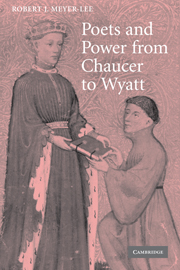Book contents
- Frontmatter
- Contents
- Acknowledgments
- Notes on citations
- Introduction: Laureates and beggars
- PART I BACKGROUNDS
- PART II THE FIRST LANCASTRIAN POETS
- PART III FROM LANCASTER TO EARLY TUDOR
- 4 Lydgateanism
- 5 The Trace of Lydgate: Stephen Hawes, Alexander Barclay, and John Skelton
- Epilogue: Sir Thomas Wyatt: Anti-laureate
- Notes
- Works cited
- Index
5 - The Trace of Lydgate: Stephen Hawes, Alexander Barclay, and John Skelton
Published online by Cambridge University Press: 27 October 2009
- Frontmatter
- Contents
- Acknowledgments
- Notes on citations
- Introduction: Laureates and beggars
- PART I BACKGROUNDS
- PART II THE FIRST LANCASTRIAN POETS
- PART III FROM LANCASTER TO EARLY TUDOR
- 4 Lydgateanism
- 5 The Trace of Lydgate: Stephen Hawes, Alexander Barclay, and John Skelton
- Epilogue: Sir Thomas Wyatt: Anti-laureate
- Notes
- Works cited
- Index
Summary
When Henry Tudor crossed the Channel in 1485 to seize the throne from Richard III, he apparently brought along a poet laureate – Bernard André, the “Blynde Poete” of Toulouse. Unlike any other poet writing for an English king before him (at least that we know of), André, in his role as poet, possessed an unambiguous status at court: he was a well-paid professional, the top man in Henry's troupe of highly educated, foreign-born propagandists. By no later than November 1486, Henry had granted “Bernardo Andreae Poetae Laureato quandam annuitatem,” and André would continue in the office underwritten by this grant until his death around 1522, dutifully churning out political paeans, pedagogical works, devotional treatises, and historical encomia for the first two Tudor kings. His laureateship possessed neither the exclusivity nor the status of an official recognition for artistic accomplishment of its modern counterpart; nonetheless, like the latter, it was a very visible position of honor intimately connected with the interests of the State. Henry's establishment of this office, from one perspective, was a tremendous innovation, an importation of a Burgundian practice into an English literary system in which the use of poets for political purposes had been ad hoc, if not haphazard. But from another perspective, Henry simply completed the process begun by his Lancastrian ancestors. As I observed in Chapters 2 and 3, soon after seizing the throne from Richard II, Henry IV invited Christine de Pizan to his court, and, failing to gain the services of this au courant continental poet, he relied instead on the insular efforts of Hoccleve and Lydgate.
- Type
- Chapter
- Information
- Poets and Power from Chaucer to Wyatt , pp. 174 - 219Publisher: Cambridge University PressPrint publication year: 2007



